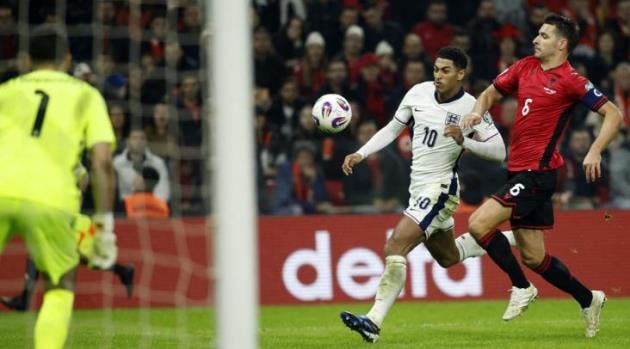Bellingham shows why he should start at the World Cup
The 22-year-old midfielder exploded on his return to No. 10, creating the string of chances that led to Harry Kane's opener against Albania and cementing his place as a starter under Tuchel
The defining moment of the game came as Jude Bellingham was restored to his natural No. 10 role in the second half. From there, he created a succession of key plays and directly set up the sequence of events that led to the corner from which Harry Kane scored the opener against Albania. It was a clear answer to the question of why Bellingham should start at the World Cup.

Development: from bewilderment to control
Bellingham returned to the England starting line-up for the first time since June, attracting particular attention after much debate over his form and role. Against Albania, Thomas Tuchel deployed a new system, requiring Bellingham to share the No. 10 space with Declan Rice in many situations – an arrangement that left him somewhat unsettled in the early minutes.
The 22-year-old midfielder was keen to move wide: constantly switching positions with Jarrod Bowen to open up space, then dropping back to swap with John Stones to receive the ball from the back. Initiative is Bellingham’s trademark, but sometimes his desire to make an impact leads him to rush things. At one point he even nearly collided with Myrto Uzuni – a detail that exposed the impatience of a player who wants to do too much when the game is not going his way. The positive thing is that Bellingham quickly calmed down, gradually adjusting to get into the rhythm.
In a lacklustre first half for the Three Lions, a quick one-two between Bellingham and Harry Kane provided the only bright spot. Bowen finished with a shot aimed at Thomas Strakosha, but it was Bellingham's through ball that broke through Albania's compact defence and created the clearest chance of the first half.
Tactical analysis: pure number 10 liberates Bellingham
When Tuchel adjusted after the break and returned Bellingham to a pure No. 10, his energy and influence changed immediately. No longer sharing space or restricting his movement, Bellingham played to his natural instincts: creative, decisive, unpredictable – something England had lacked throughout the first half.
- A sharp through ball opened up a delicious opportunity for Eberechi Eze.
- A delicate pass to Jarell Quansah to escape, indirectly creating a dangerous shot by Bukayo Saka.
- A powerful dribble forced the Albanian defense to quickly clear the ball, leading to a corner kick – the situation where Kane opened the scoring.

Details that show class
Bellingham reiterated why he is considered one of the standout midfielders at 22: his fluid passing to progress the lines, his intelligent vision and the right amount of daring to break the deadlock. When space opens up between the lines, he exploits it with a through-ball pass or a quick first touch to get past a compacted defence.
Reactions and messages from the technical area
Unsurprisingly, Bellingham was unhappy to be withdrawn when he was in form. After the game, Tuchel stressed the importance of the team’s rhythm – a clear message that individual contributions must serve the overall structure.
Impact on 2026 World Cup plans
The Albania game showed that England needed a central midfielder who could hold the ball up, carry the ball, unlock the defence and contribute to the total pressure. Bellingham ticked all the boxes and showed maturity: not only did he rely on inspiration, he also adapted quickly to new tactical demands and a more complex role.
When England return to training in March, Bellingham is likely to remain at the top of the German’s plans. If the Three Lions are to progress further at the 2026 World Cup, he will almost certainly be in the starting line-up – not just because of his skills, but also because of the competitive nature that few of Tuchel’s players possess.








